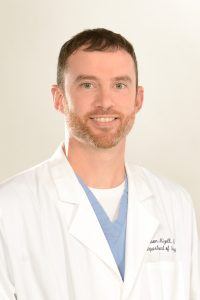UAMS surgeon teaching students about financial health, business of medicine
by May 9, 2019 11:54 am 1,555 views

When Dr. Jason Mizell started working as a colorectal surgeon at the University of Arkansas for Medical Sciences, he realized his financial knowledge – professionally and personally – was limited. And he realized he was not alone.
So he’s developed a course teaching medical students how to manage money, professionally and personally, before they get to that point. And now he’s trying to figure out how the course can be offered to students elsewhere, and if there is a business case for doing so.
The northwest Louisiana native was recruited out of Baylor University Medical Center in Dallas to be the second colorectal surgeon at UAMS. He came to Arkansas in 2010 and became aware of his own lack of financial acumen regarding everything from investing to billing and coding.
He decided to develop a course for surgery residents with help from a couple of UAMS physicians who understood both health care and personal finances. He started teaching it in 2011.
“I was very much learning on the fly, and so I wanted to make sure that my learners, the residents and medical students that I taught, were not as deficient in financial education as I was,” he said.
The initial response was good. The residents were saying they enjoyed it. The work was ultimately published in a medical journal.

“It just showed that it turns out if you teach really a bunch of fairly intelligent people about money, they can learn it,” he said. “You know, we’re scientists, generally, by training, and we have decent brains, most of us, but we just have so little exposure. We’re really sitting ducks when we get to the financial world.”
It soon became obvious that the course had one major flaw: It came too late. The residents who were taking the course had already made major financial mistakes taking on too much credit card debt and buying expensive cars and homes. In response, he changed the course so that it would be offered to fourth-year medical students, not residents, and to serve all disciplines, not just surgeons.
Now, his Business of Medicine is a 20-hour course taught for two hours every 10 weeks on Monday nights, mid-January to mid-April. About 60% is personal finance and the rest is professional. Classes usually involve a guess lecturer, although he has taught more of the material as he has become more comfortable with it.
Topics range from student loans to avoiding malpractice suits. One lecture covers buying versus renting a home, which is a timely topic for 160 students who have just matched with their residencies and now must make housing arrangements.
Mizell said the course comes at a good point in their education.
“It’s really a very small snippet of time where they really do buy in because they don’t have to study more science for a while, and they can actually study on something that’s a little more fun and very practical,” he said.
The night before speaking to Talk Business, the class had covered budgeting. Students were given a hypothetical salary of $300,000 and broke up into seven groups to cover subjects ranging from cars to houses to what kinds of schools to send their kids to. Then the students came back and presented their plans. Five out of five years, they’ve spent more than they made – that night by $4,000 per month. There were “a lot of very scared students” wondering how they would make it.
“Every year the budget has been overdrawn because physician students just assume that they can have the max of everything they want,” he said.
Meanwhile, he’s created a finance course that’s available to students starting their first year and for the years after that.
Mizell said the Business of Medicine course is unique in its depth and comprehensiveness. Medical students simply aren’t taught about money, which is one reason why there are 50- and 60-year-old physicians who have saved very little.
“Physicians are notorious for showing their wealth but not saving their wealth, so it’s disheartening but also just confirms the need is when you see people who are near retirement and have no retirement accounts,” he said.
Mizell said his course has become the “standard for medical financial education.” That means there is an opportunity to spread the word – and perhaps, make a business out of it. He has lectured elsewhere, including at Wake Forest, which is modeling its program after his, and also spoken at conferences in Mississippi and to a national colorectal society. Parts of the course have been adapted at Vanderbilt.
But he’s not sure how to package it. Millennial students will listen to a lecture with dynamic speakers, but he doesn’t think a recording would capture their attention. The resources to create a comprehensive course are limited. Plus he’s busy with his other duties at UAMS.
In other words, he’s got a message. At this point, he’s still figuring out how to spread it.
“I think the opportunity is there, and I think it’s a fairly low-hanging fruit,” he said. “It’s just a matter of being able to do it.”
Editor’s note: Talk Business & Politics Roby Brock contributed to this story.
